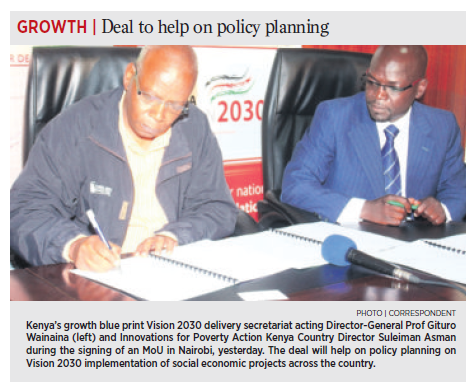
In June,
our Kenya team signed an MOU with the Kenyan government Vision 2030 program to collaborate on research outreach and public policy forums, particularly on themes related to the Sustainable Development Goals. The first such forum was last week's closed policy forum conclusion to the
Evidence Summit.
But I would add that it's long-term, local, and relevant relationships that are needed most. What's next for research into policy in Kenya? Here are five key take-aways for researchers, and especially for IPA's role in Kenya.
Help build capacity at all levels in relevant ministries to understand exisiting evidence and relevant implications of the research. We already do this with relevant partners and through some events, but this means we need many more one-on-one conversations and workshops on an on-going basis.
Present results in a single report and synthesize overall policy action. We aim to do that through our plain language evaluation summaries of all of our studies, but to contextualize it and ensure decision-makers see and understand it requires many more one-on-one conversations, collaborative iteration of summaries, and working groups with clear next-step conclusions.
Engage policymakers at the beginning of a study. We have learned that especially governments and policymakers, but really all levels of decision-makers, need evidence that answers the questions they are actually grappling with, not necessarily the most academically interesting questions (though we try to find both!). And they also need this information to be timely and take policy realities into consideration. We can only do this with, you guessed it, more conversations even before we start a study.
Share results broadly with all stakeholders. As the global communications team lead, I like to think that's what we're doing well, but we've learned over the years that what is really needed is not just easy-to-read write-ups and compelling design, like what we create globally, but rather, continued conversations and workshops with local policymakers to explain why those fancy write-ups matter in their context.
Involve local researchers not just international researchers. In many of our countries, including Kenya, IPA is building partnerships with local universities to train the next generation of researchers in rigorous evaluations and bringing together local and international researchers. But there is a long way to go, and the local researchers there said it was especially hard to find funding for their studies. A couple of World Bank attendees suggested that new researchers should team up with organizations respected for their research rigor and local relationships - like IPA - to improve funding chances. And so, we began more conversations to engage local researchers.
Our teams on the ground are well positioned to act on these lessons. Especially in Kenya where our Country Director
Suleiman Asman (pictured above) has been working with IPA for over seven years, they are building and facilitating these relationships. This means that even if the most respected researchers we work with are based in Cambridge, New Haven, or Berkeley, and the communications team writes our research summaries in New Haven, New York, or DC, that our team of over 520 staff in Kenya can continue building and facilitating the relationships, holding those on-going conversations and follow-up workshops that ensure that both policy relevant questions are addressed and research design and data collection remains rigorous and relevant. And that kind of relationship is what will build useful research and ensure it is used by those who need it most.
 In June, our Kenya team signed an MOU with the Kenyan government Vision 2030 program to collaborate on research outreach and public policy forums, particularly on themes related to the Sustainable Development Goals. The first such forum was last week's closed policy forum conclusion to the Evidence Summit.
In June, our Kenya team signed an MOU with the Kenyan government Vision 2030 program to collaborate on research outreach and public policy forums, particularly on themes related to the Sustainable Development Goals. The first such forum was last week's closed policy forum conclusion to the Evidence Summit.











